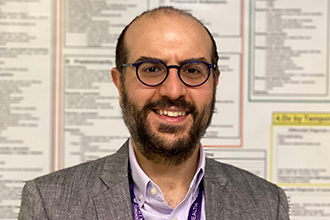Understanding infection risks in patients with myasthenia gravis

By Jennifer Stranges

Dr. Charles Kassardjian
Myasthenia gravis (MG) is a serious autoimmune neuromuscular disease. Immunosuppression or immunomodulating therapies are used to treat patients with MG but have the potential to suppress or alter the immune system, with infections being one major risk.
Dr. Charles Kassardjian, a neurologist and researcher at St. Michael’s Hospital, recently published the largest study on infection risk within the field of neuromuscular medicine. We caught up with Dr. Kassardjian about his research, published in the European Journal of Neurology, and why the findings are significant for physicians who treat patients with MG.
Why did you explore infection risks in patients with MG?
My academic focus is in quality improvement and patient safety, and so I have been interested for a while in the risks associated with immune therapy. Remarkably, there are almost no data from large cohorts to help guide discussions with patients about the risks of infection associated with treatment despite common use of immunosuppressants– so there was a huge gap in knowledge. Because of this gap, our research results are novel and exciting. These are serious risks that patients need to be aware of, and there are no guidelines specifically for neuromuscular disease to help clinicians gauge risk, or decide about preventative antibiotics.
What were your key findings?
About one third of the MG patient cohort developed a serious infection during the study period, compared to under 20 per cent of the age and gender matched comparators. After adjusting for confounding variables, we found that patients with MG were at a 39 per cent higher risk of developing a serious infection. The most common infections were respiratory – for example, pneumonia – but there were increased rates of skin infections, sepsis, post-operative infections, shingles and influenza, among others.
Did anything about the findings surprise you?
I was surprised by the magnitude of the difference in the infection risk and breadth of types of infection. I was also surprised that more patients in the MG group did not develop PJP (a serious fungal pneumonia), since we are often taught that patients on chronic immunosuppression – especially prednisone at high doses for long periods – should be on antibiotics to prevent this infection.
Why is this research significant?
This research provides clinicians with real-world data to inform their patients of infection risks, and which infections are most likely. In addition, MG is a disease that is managed not only by neuromuscular specialists, but also general neurologists and internists, and of course with active involvement from family physicians. Therefore, the findings are of interest and applicable to a large audience of clinicians.
Although we did not study other diseases, the findings raise the possibility of higher infection risk in other autoimmune neurological diseases for which immunosuppression is used, and will hopefully spur further studies.
Finally, there are some important practical implications. For example, the higher rates of influenza and shingles in the MG group suggests that clinicians should consider vaccination for these entities in MG patients. I hope that data such as these are eventually used to create specialty-specific guidelines.
About St. Michael’s Hospital
St. Michael’s Hospital provides compassionate care to all who enter its doors. The hospital also provides outstanding medical education to future health care professionals in more than 27 academic disciplines. Critical care and trauma, heart disease, neurosurgery, diabetes, cancer care, care of the homeless and global health are among the Hospital’s recognized areas of expertise. Through the Keenan Research Centre and the Li Ka Shing International Healthcare Education Centre, which make up the Li Ka Shing Knowledge Institute, research and education at St. Michael’s Hospital are recognized and make an impact around the world. Founded in 1892, the hospital is fully affiliated with the University of Toronto.
About Unity Health Toronto
Unity Health Toronto, comprised of Providence Healthcare, St. Joseph’s Health Centre and St. Michael’s Hospital, works to advance the health of everyone in our urban communities and beyond. Our health network serves patients, residents and clients across the full spectrum of care, spanning primary care, secondary community care, tertiary and quaternary care services to post-acute through rehabilitation, palliative care and long-term care, while investing in world-class research and education. For more information, visit www.unityhealth.to.
